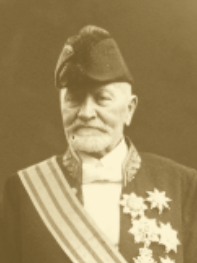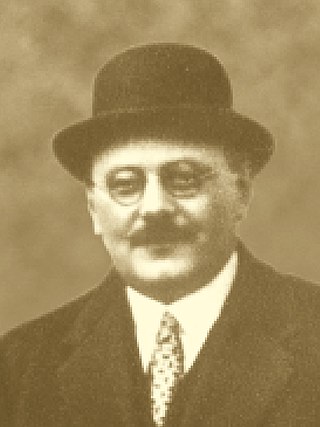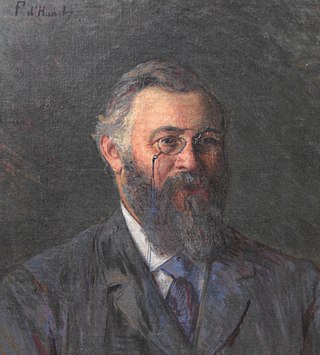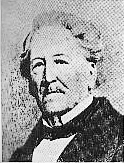
The Democratic Party, is the major social-liberal political party in Luxembourg. One of the three major parties, the DP sits on the centre to centre-right, holding moderate market liberal views combined with a strong emphasis on civil liberties, human rights, and internationalism.

Marie-Adélaïde, was Grand Duchess of Luxembourg from 1912 until her abdication in 1919. She was the first Grand Duchess regnant of Luxembourg, its first female monarch since Duchess Maria Theresa and the first Luxembourgish monarch to be born within the territory since Count John the Blind (1296–1346).

Paul Eyschen was a Luxembourgish politician, statesman, lawyer, and diplomat. He was the eighth prime minister of Luxembourg, serving for twenty-seven years, from 22 September 1888 until his death, on 11 October 1915.
The National Union Government was a form of national government that governed the Grand Duchy of Luxembourg between 1945 and 13 February 1947, in the direct aftermath of the Second World War. During the war, Luxembourg was invaded, occupied, and annexed by Nazi Germany. Just one of the Luxembourgish casualties of the conflict was the pre-war political system; most of the established parties and alliances disappeared, and some of the leading politicians had lost their lives.

Victor Thorn was a Luxembourgish politician. He was the 11th prime minister of Luxembourg, serving for one year, from 24 February 1916 until 19 June 1917.

Léon Kauffman was a Luxembourgish politician. He was the 12th prime minister of Luxembourg, serving for one year, from 18 June 1917 until 28 September 1918.

Pierre Prüm was a Luxembourgish politician and jurist. He was the 14th prime minister of Luxembourg, serving for a year, from 20 March 1925 until 16 July 1926.
The Party of the Right, abbreviated to PD, was a political party in Luxembourg between 1914 and 1944. It was the direct predecessor of the Christian Social People's Party (CSV), which has ruled Luxembourg for all but fifteen years since.

From August 1914 until the end of World War I on 11 November 1918, the Grand Duchy of Luxembourg was under full occupation by the German Empire. The German government justified the occupation by citing the need to support their armies in neighbouring France, although many Luxembourgers, past and present, have interpreted German actions otherwise.

Dr. Michel Welter was a Luxembourgish politician, and former leader of the Socialist Party. A member of Luxembourg's Chamber of Deputies, he served as the Director-General for Agriculture, Commerce, and Industry from 24 February 1916 until 3 January 1917, during the German occupation.
The Liberal League was a political party in Luxembourg between 1904 and 1925. It was the indirect predecessor of the Democratic Party (DP), which has been one of the three major parties in Luxembourg since the Second World War.
General elections were held in Luxembourg on 26 October 1919. They were the first held after several constitutional amendments were passed on 15 May of the same year. The reforms had introduced universal suffrage and proportional representation, increased the electorate from 6% of the population to 42%, and vested national sovereignty in the people, as opposed to the Grand Duke. They were also the first elections held after the German occupation during World War I.

The Fontaine Ministry formed the government of Luxembourg from 1 August 1848 to 2 December 1848. It was headed by Gaspard-Théodore-Ignace de la Fontaine.

The Dupong-Krier Ministry took office in Luxembourg on 5 November 1937 after the resignation of the prime minister Joseph Bech, due to the result of a referendum on the so-called Maulkuerfgesetz.
The Loutsch Ministry was in office in Luxembourg from 6 November 1915 to 24 February 1916.

The Reuter Ministry was the government in office in Luxembourg from 28 September 1918 until 20 March 1925, headed by Émile Reuter. It resulted from the Chamber elections of 28 July and 4 August 1918 and was reshuffled on 5 January 1920 as a result of the elections of 26 October 1919. There was a further reshuffle on 15 April 1921, when the Liberals left the government.

The Simons Ministry was in office in Luxembourg from 23 September 1853 to 26 September 1860. Initially it just consisted of three members of the government, to which two more were added on 23 September 1854.

The Eyschen Ministry was in office in Luxembourg for 27 years, from 22 September 1888 to 12 October 1915. It was headed by Paul Eyschen, and ended with his death.

The Thilges Ministry formed the government of Luxembourg from 20 February 1885 to 22 September 1888.












